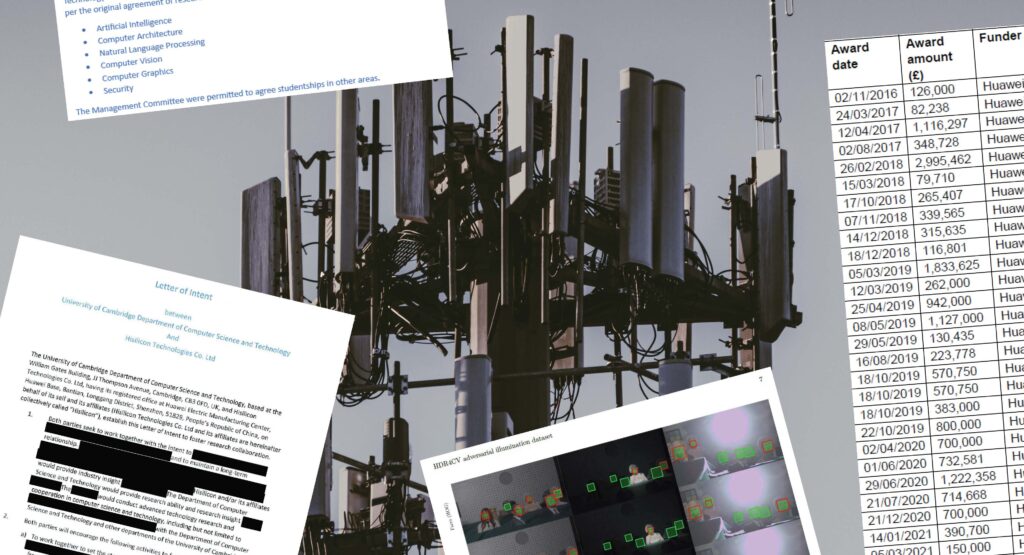
UKCT has published [28/10/23] a report on the relationship between the University of Cambridge (Cambridge) and Huawei. The report is informed by internal due diligence files reviewed by UKCT, along with open-source research and a dozen Freedom of Information (FOI) responses, which we have published in full in our digital library.
This report is the second part of a rolling project, UK-China Transparency’s Cambridge China Files. The first part explored Cambridge’s work with the Chinese military.
The report shows how:
- Since 2016, Cambridge has received roughly £28m from Huawei and its subsidiaries for high-tech research in sensitive areas such as artificial intelligence (AI), Internet of things, cybersecurity and network technology.
- This support continued after the UK government opted to ban Huawei from core parts of the UK 5G network. Although Cambridge has since stopped accepting new funding from Huawei, the supported research continues.
- AI research at Cambridge involving Huawei funding spans a range of areas, including autonomous transport, swarm robotics, and image, face & speech recognition.
- Huawei built links with scientists working in sensitive areas: one network technology expert funded by Huawei has co-written papers with Huawei and scientists linked to China’s military; other recipients of Huawei funding run projects linked to Western defence ministries.
- Cambridge has made claims that are arguably misleading about the nature of this support and its relation to 5G technology and potential military applications.
- Cambridge has acted to obscure the university’s relationship with Huawei by redacting key information from FOI releases and opting not to refer publicly to Huawei’s funding of specific programmes.
- A top Cambridge ethics committee approved millions of pounds of funding from Huawei for research with surveillance applications without duly considering the ethical ramifications.
Cambridge issued the following statement in response to UKCT’s report:
“The University of Cambridge, like all other global research universities, relies on international collaboration to make possible the discoveries which improve the lives of people worldwide, from antimicrobial resistance and climate change mitigation to treatments for disease and sustainable finance.
“In March 2022, the University of Cambridge stopped all new engagements with Huawei for the foreseeable future after years of self-imposed restrictions on that relationship dating back to 2018 when the UK government was still welcoming Huawei’s involvement in UK 5G.
“All grants and donations from China are subject to robust scrutiny, backed by a specially formulated set of principles for managing risks in international engagements which include, where necessary, assessment against UK Government Export Controls and close collaboration with the UK Government’s Research Collaboration Advice Team (RCAT). Less than one percent of our annual research spend is derived from China.
“Our pages on international collaboration (https://www.strategic-partnerships.admin.cam.ac.uk/managing-risks-international-engagement) are clear in terms of our strategic approach and guidance. Readers of this report may wish to review all of these pages, but in particular Research Governance | Strategic Partnerships Office (cam.ac.uk) and checks for research and philanthropic donations (https://www.strategic-partnerships.admin.cam.ac.uk/managing-risks-international-engagement/responsible-collaboration).
“Our approach includes full consideration of and compliance with UK government export controls and a thorough due diligence process. This is a pragmatic risk-based approach and was put in place to be transparent.”
*
UKCT would like to thank James Heale for sharing an FOI response with us. This and other FOIs were critical for our research and have been published in our digital library.